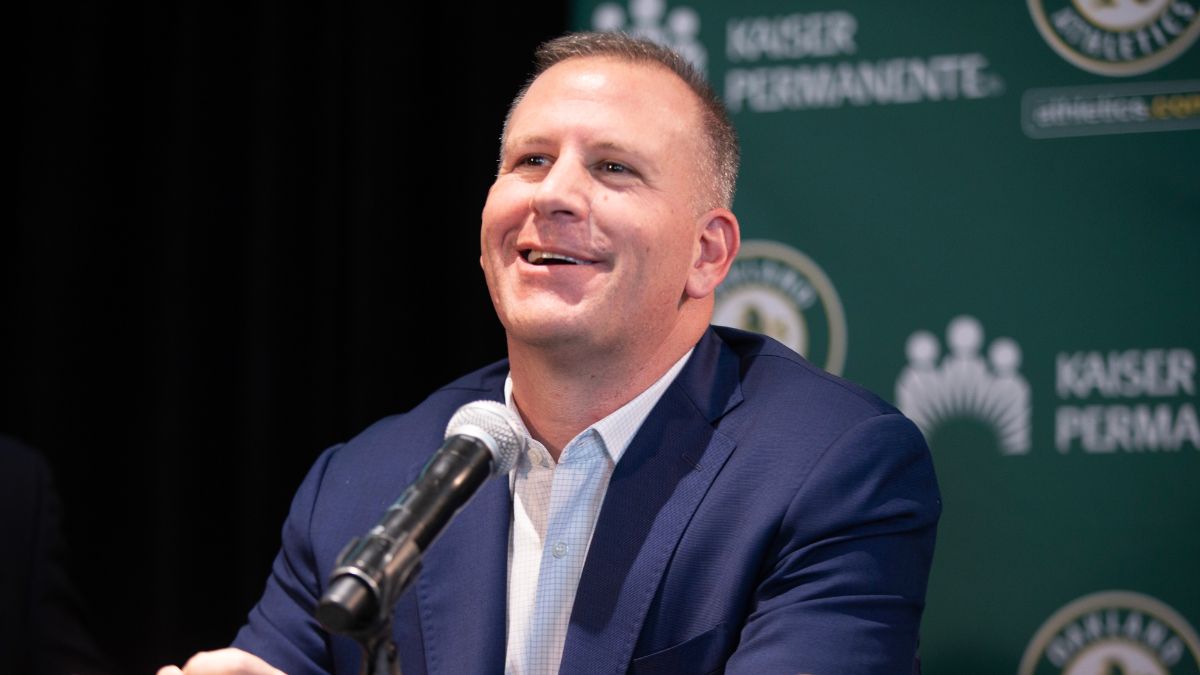The Athletics' string of significant moves this week cleared yet another hurdle toward their push for a new Las Vegas stadium.
Nevada Gov. Joe Lombardo officially signed Senate Bill 1 -- the franchise's request for $380 million of public funding to construct a new ballpark on a nine-acre plot -- into law Thursday evening. Now, the team already is focused on what's next.
"Today is a significant step forward in securing a new home for the Athletics," a statement issued by the A's shortly after read. "We thank Nevada Governor Lombardo, Legislative leaders, and Clark County Commissioners and staff for their hard work, support, and partnership. We will now begin the process with MLB to apply for relocation to Las Vegas.
Stay in the game with the latest updates on your beloved Bay Area and California sports teams! Sign up here for our All Access Daily newsletter.
"We are excited about Southern Nevada’s dynamic and vibrant professional sports scene, and we look forward to becoming a valued community member through jobs, economic development, and the quality of life and civic pride of a Major League Baseball team."
The bill was sent to Lombardo's desk after both the Nevada Assembly and Nevada Senate approved the bill earlier this week.
MLB owners still needs to approve of the team's relocation from Oakland to Las Vegas, which requires 75 percent approval.
Earlier on Thursday, MLB commissioner Rob Manfred had a lot to say about the A's entire process. He said the vote from MLB owners depends on how quickly the A's can get their formal relocation application together, and added that he will appoint a relocation committee to review it.
Athletics
Find the latest Athletics news, highlights, analysis and more with NBC Sports Bay Area and California.
While he said there's still plenty of work to be done, the commissioner wouldn't predict a timeline for the process. He did, however, explain what exactly happens during that period.
"They have to submit an application, there are pretty rigorous requirements about the application: you have to talk about the market you’re leaving, the efforts you’ve made there; the markets you want to go to, why it’s better," Manfred explained. "It then goes to a relocation committee that has to review the application and make recommendations on things like operating territory, home television territory.
"That recommendation comes to me, goes to the executive council, they ultimately make recommendations to the clubs, and then there has to be a three-quarter vote."
Manfred revealed some of the conversations he has had with owners regarding the potential relocation in recent days.
"It has always been baseball’s policy and preference to stay put," he said. "I think that always colors any conversation about relocation. Having said that, I think the owners as a whole understand that there has been a multi-year, pushing-a-decade effort where for the vast majority of the time, the sole focus was Oakland.
"Look, believe me, and I hear from ‘em, I feel sorry for the fans in Oakland. I do not like this outcome, I understand why they feel the way they do. I think that the real question is, what is it that Oakland was prepared to do? There is no Oakland offer, OK? They never got to a point where they had a plan to build a stadium at any site. And it’s not just John Fisher. You don’t build a stadium based on the club activity alone. The community has to provide support and you know, at some point, you come to the realization, it’s just not going to happen."
MLB charges a hefty fee for teams looking to relocate. For the A's, it would be about $300 million.
Back in December, Manfred said the league would waive the A's relocation fee if they did move to Vegas. And again on Thursday, he was asked about the relocation fee process.
"The relocation fee, the ultimate decision, will be made in the process that I described a moment ago," Manfred said. "I’ve been clear with the owners: in the context where you have an owner who’s making a billion-dollar private commitment moving to a market where they receive public funding, for baseball to step in and have a relocation fee, I don’t see that as a realistic possibility."
On top of the relocation having to be approved by MLB, the A's have a number of additional hurdles to clear before the move is official.
The A's must prove they can come up with the remaining $1.1 billion in private financing to fund the rest of the $1.5 billion ballpark project. After that, the team will have to find a temporary home as their current lease with the Oakland Coliseum is set to end after the 2024 MLB season and their new Vegas ballpark wouldn't open until the start of the 2028 season.
Additionally, per The Nevada Independent, the A's must negotiate with the Las Vegas Stadium Authority to "establish a development agreement, lease agreement and non-relocation agreement, as well as a community benefits agreement for certain investments in the Las Vegas community."
The final designs of the Las Vegas ballpark also need to be evaluated by the Federal Aviation Administration since the construction site is two miles away from the Harry Reid International Airport.
Until then, the A's still have a lot of work to do.


